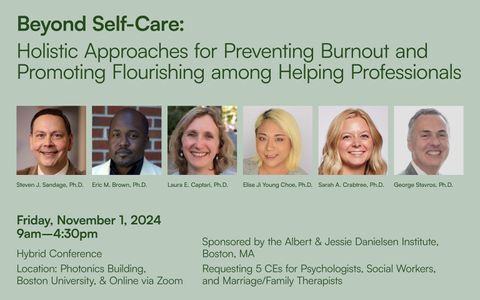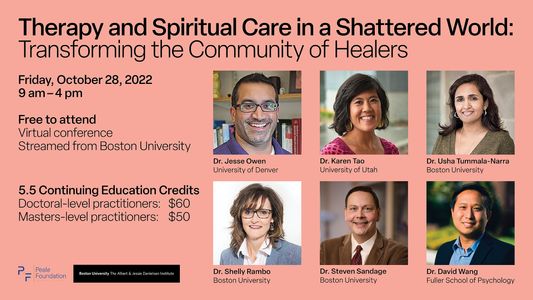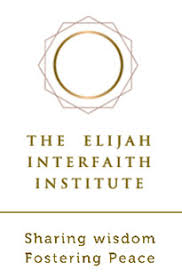Supporting Helping Professionals
Thanks to a generous grant from The Peale Foundation, the Danielsen Institute research team has embarked on a multi-year project entitled “Positive Psychology and Formation-Based Flourishing among Spiritual Leaders and Therapists.” Through interdisciplinary cross-sectional and longitudinal research projects, we hope to learn more about these helping professionals’ experiences, especially the factors that contribute to a sense of well-being and risk for burnout. We intend to use this research to develop resources aimed at supporting the well-being of current and future helping professionals. This page will be regularly updated as new projects are launched and findings are published or presented. If you would like to receive email updates, please email dires@bu.edu requesting to be added to our research interest list.
Current Research Opportunities
 CHRYSALIS
CHRYSALIS
The COVID-19 pandemic. Systemic oppression. Political upheaval. Human rights abuses. Increased mental health need. Climate impacts. Collective trauma. These are just a few of many national and global crises facing our world today, which have taken a unique existential toll on psychotherapists, chaplains, and clergy who are on the frontlines of offering support.
Are you feeling taxed as a helping professional? Seeking opportunities for self-reflection, personal growth, or connection with others in your field? If so, Boston University’s Albert and Jessie Danielsen Institute invites you to participate in a research study evaluating a new empirically-based personal and professional formation program designed specifically for mental health care workers, chaplains, and clergy.
This free 8-week online program, including group and individual formats, will include opportunities to:
- Process the psychological, emotional, relational, and spiritual/existential impacts of companioning others amidst trauma and suffering.
- Identify and develop personal capacities and culturally embedded strengths to metabolize these impacts in order to build resilience and thrive as a whole person.
- Reflect on your intersectional identities, life experiences, and core values, and how these inform your work.
- Interrogate and resist personal, relational, and systemic pressures that are counter to your well-being, while working toward systemic change.
Participating in this randomized intervention study will help us better understand the unique needs of helping professionals in today’s world and refine and evaluate this novel online program in order to promote helping professionals’ flourishing. Financial compensation (up to $60) is available for completion of self-assessment measures and program feedback surveys.
Click here to complete a brief interest form, and we will be in touch with you shortly with further information.
Questions about this study? Contact Dr. Steven Sandage, the Principal Investigator, at ssandage@bu.edu.
Publications

Our third publication centered on seminary formation among Jewish seminary students and was in partnership with Hebrew College and additional funds from the Covenant Foundation. This is one of the first published studies specifically focused on spiritual formation in Jewish theological education in many years and points to important connections between spirituality, human development, and social justice across the various relational contexts involved in training spiritual leaders.
Stein, L.B., Gerstenblith, J.A., Sandage, S.J, Hydinger, K.R., Klein, D.S., Tanchel, S. Crabtree, S.A. (2024). Student Perspectives on Spiritual Formation at a Jewish Pluralistic Seminary: A Qualitative Study.Pastoral Psychology (2024). https://doi-org.ezproxy.bu.edu/10.1007/s11089-024-01169-0
Abstract
Spiritual formation has historically been considered an important part of theological education for seminary students. Empirical research in this area has grown over the past 15 years; however, this research has been almost exclusively in Christian contexts. As the demands on clergy become increasingly challenging, it is necessary to understand spiritual formation processes among emerging religious leaders across diverse traditions. We build on a growing body of research by offering a brief comparative analysis of prior research related to spiritual formation in Christian and Jewish seminaries. Using reflexive thematic analysis, we analyzed 36 student perspectives on spiritual formation at a Jewish pluralistic seminary in the United States. Students described formation processes occurring in three contexts: (a) on-campus seminary-sponsored activities (e.g., t’filah/prayer); (b) off-campus seminary-sponsored experiences (e.g., clinical pastoral education); and (c) non-seminary-sponsored resources (e.g., psychotherapy). We center the uniquely Jewish aspects of students’ requests for more training in areas such as practical rabbinics and social justice (i.e., tikkun olam, repairing the world), relational growth and virtue development (i.e., middot, character development), and spiritual reflection and restorative practices (i.e., Shabbat observance), while also connecting these findings to larger trends in Christian seminary education. Future research directions and implications for Jewish seminary training are considered, drawing upon interdisciplinary relational spirituality frameworks.
Our second publication from this project is a systematic literature review of 82 empirical studies that look at clergy and/or chaplain burnout, trauma impacts, and/or well-being. We were able to highlight relational, systemic/organizational, and diversity issues that are crucial for gaining a more holistic understanding of these issues. The citation is below.
Hydinger, K. R., Wu, X., Captari, L. E., & Sandage, S. (2024). Burnout, Trauma Impacts, and Well-Being Among Clergy and Chaplains: A Systematic Review and Recommendations to Guide Best Practice. Pastoral Psychology. https://doi.org/10.1007/s11089-024-01150-x
Abstract
Religious leaders (i.e., clergy and chaplains) face unique, ongoing stressors that can increase risks for psychosocial and vocational vulnerabilities. Emerging evidence indicates concerning prevalence rates of distress and attrition among these professionals, particularly since the COVID-19 pandemic. To date, most empirical work has focused on compromised functioning among religious leaders. Utilizing a more holistic approach, this systematic review explores individual, relational, and organizational factors associated with diverse outcomes. Following the PRISMA methodology, we identified 82 empirical articles investigating (a) risk and protective factors related to burnout, trauma impacts, spiritual distress, and other occupational hazards and/or (b) factors associated with well-being and flourishing, over and above distress reduction. We summarize the state of the available evidence, distinguishing between risk increasers, protective factors, and well-being enhancers. Attention is given to three domains: individual (e.g., demographics, personality factors, virtue development, coping and formation practices), relational (e.g., peer, family, and collegial supports; navigation of conflicts and polarized issues in one’s community of care), and institutional (e.g., role ambiguity or clarity, resource availability, systemic expectations and demands). We identify notable gaps to be addressed in future research; for example, most studies are cross-sectional, lack diversity in religion, gender, and geography, and operationalize well-being as the absence of symptoms rather than the presence of positive states and functioning. Considering the available evidence, we present best practices to guide psychological practitioners, denominational bodies, and others involved in religious leaders’ formation.
We are very excited to announce our first empirical publication since beginning our CHRYSALIS formation program in spring 2023. Promising findings include significant reduction in burnout and vicarious traumatization, increases in well-being and meaning, and growth in strengths and virtues. This is the first-ever RCT of a community-based intervention specifically designed to pro-actively address helping professionals’ needs. Below is the abstract and citation, including a link to the article.
Captari, L. E., Choe, E. J. Y., Crabtree, S. A., Sandage, S. , Gerstenblith, J. A., Stein, L. B., Hydinger, K. R., & Stavros, G. (2024). The Development and Feasibility of a Novel Group Intervention to Support Helping Professionals in Metabolizing Suffering and Engaging Strengths: The CHRYSALIS Program. International Journal of Group Psychotherapy, 1–40. https://doi.org/10.1080/00207284.2024.2329565.
Abstract
This feasibility study reports on the development and initial evaluation of a novel online intervention for helping professionals (HPs; i.e. mental health professionals, chaplains, clergy) designed to (a) address occupational hazards, such as burnout and vicarious traumatization, and (b) promote well-being and flourishing at work. In contrast with competency and self-care focused models, the CHRYSALIS (Catalyzing Helping Professionals’ Resilience, VitalitY, Spirituality, Authentic Living, and Inner Strength) intervention centers the self of the provider, explores cultural and spiritual contexts, and attends to systemic challenges. As part of a larger randomized controlled trial evaluating two program formats, the group format entails eight online sessions exploring strengths that can promote well-being, including processing, relational, vitalizing, orienting, and agentic capacities. To pilot test this framework and establish proof of concept, this study analyzed data from 41 HPs who had been randomly assigned to the group condition and completed surveys at four time points. Quantitative results indicated significant reductions in vicarious traumatization and burnout as well as increased well-being and meaning in work. Qualitative results suggest the intervention fostered relational support, cultivated new perspectives, and increased engagement with strengths, positively impacting participants’ work and navigation of caregiving systems. Feedback about cohesion and group dynamic challenges in an online format informed further program development. This study provides initial support for the feasibility and efficacy of the group format of the CHRYSALIS intervention as a creative means to address HPs’ risk for occupational hazards and promote holistic formation in a relational context.
Conferences
On November 1, 2024, the Danielsen Institute hosted a free hybrid conference on holistic approaches to prevent burnout and promote flourishing among helping professionals. A replay of the conference is available on our video page here.

On October 28, 2022, the Danielsen Institute hosted a free virtual conference geared toward religious leaders and mental health providers. You can watch the replay and download the slides for each presentation from the conference’s webpage.

2022-2023 Online Survey for Helping Professionals
We have completed data collection and are beginning to present some of our findings as of June 2024. Please see the next section for overviews of those presentations.
The Albert & Jessie Danielsen Institute seeks to understand the mental health needs among spiritual leaders and mental healthcare providers at individual, relational, and organizational levels. In partnership with the Norman Vincent Peale Foundation and the Boston University School of Theology, the Danielsen will begin Phase 1 of this 5-year project by surveying working chaplains, clergy, and mental health providers about the realities of working in these professions. Participants in romantic partnerships will also be able to invite their partners to complete a survey about their experiences being partnered with someone working in one of these fields.
Peale Project in Public Discourses

In December 2024, Drs. Laura Captari and Judy Gerstenblith presented “A Perfect Storm for Trauma and Burnout among Clergy and Chaplains–and Pathways Forward” at the Boston University School of Theology.

In November 2024, Rev. Kristen Hydinger presented findings at the joint American Academy of Religion and Society for Biblical Literature annual meeting. The presentation, titled “When atonement theology needs atoning: Penal substitution and the (lack of) concern for suffering” highlighted experiences of female clergy CHRYSALIS participants.

In November 2024, Dr. Steven Sandage along with colleagues Drs. Eric Brown and Shelly Rambo gave a plenary presentation titled “Trauma, formation, and theological education: Interdisciplinary collaboration” at the ATS-sponsored CORE Conference on Trauma and Spirituality: Building Capacity for Resilience and Well-Being in Theological Education in Pasadena, CA.

Dr. Steven Sandage organized a panel titled “Trauma, burnout, and well-being among religious leaders: Risk dynamics and formative practices” at the October 2024 joint annual meeting of the Society for the Scientific Study of Religion and the Religious Research Association in Pittsburgh, PA. Rev. Kristen Hydinger gave one of the presentations of this panel highlighting findings from the recently published systematic literature review titled, “Multi-dimensional dynamics impacting burnout, trauma, and well-being of religious leaders.”

In October 2024, Dr. Sarah Crabtree gave a presentation to the Boston University School of Theology community titled “Trauma, prevention, and formation for spiritual leaders.”

In September 2024, Dr. Steven Sandage presented “Trauma, suffering, and flourishing among faith leaders” to a retreat of pastoral leaders organized by the Lilly Endowment, Inc. in Lake Tahoe, NV.

In August 2024, Dr. Steven Sandage gave an online plenary presentation to the Elijah Interfaith Institute titled “Contemporary challenges to understanding the human person: Psychological perspectives.”

Several Danielsen research team members presented at the 2024 annual convention of the American Psychological Association in Seattle, WA. Drs. Laura Captari and Steven Sandage led a continuing education workshop titled “Beyond therapist self-care: A culturally responsive framework to address burnout and vicarious trauma.” Dr. Sarah Crabtree presented a poster on behalf of the larger team titled “Work-to-family conflict and relational flourishing in helping professionals and their partners.”

Danielsen research team members Drs. Steven Sandage, Sarah Crabtree, Laura Captari, and Judy Gerstenblith were involved in 10 presentations engaging the conference theme of “Going beyond Symptom Change: Flourishing Virtues and Social Change” at the international meeting of the Society for Psychotherapy Research in Ottawa, Ontario (June 26-29, 2024). Our research presentations covered a range of topical areas including spiritual and existential dynamics in psychotherapy, virtues and flourishing among both therapists and clients, emotion regulation, and measurement based mental healthcare. This was an excellent opportunity for dialogue, learning, and collaboration with leading psychotherapy from around the world.

Rev. Kristen Hydinger presented findings from the 2022-2023 cross-sectional study at the first-ever online mid-year sessions of the American Academy of Religion in June 2024. The presentation, titled “Individual, Relational, and Systemic Factors Related to Chaplain Moral Injury,” focused on moral injury in chaplains and the protective factors of self-compassion and differentiation. It was presented through the Moral Injury and Recovery in Religion, Society, and Culture Unit.

Drs. Laura Captari and Steven Sandage discuss preliminary findings about burnout, trauma, and well-being among spiritual leaders in a June 2024 article in The Conversation. You can read the article titled “‘I love this work but it’s killing me’: The unique toll of being a spiritual leader today” here.

Dr. Eric Brown of Boston University Medical Center and colleague to the Danielsen Institute presented work from this project in his spring 2024 series of conversations with the Massachusetts Council of Churches. Dr. Brown’s talks center on trauma and broader mental health issues among Black clergy.

Dr. Elise Choe presented preliminary findings from our cross-sectional study of helping professionals at a May 2024 Mini-Conference in Atlanta, GA. Her presentation was titled “Moral injury and protective factors among mental health clinicians.”

Cantor Laura Stein presented findings on spiritual formation among Jewish clergy-in-training at the April 2024 mid-year conference of APA’s Division 36 (Psychology, religion, and spirituality). Her presentation was titled, “Spiritual Formation Research Among Jewish Clergy-In- Training: Attending to the Experiences of Queer Students,” and reviewed the limited formation research at Jewish seminaries and highlights the need for future research on the specifics of formation in light of queer students’ identities in this population.

In April 2024, Drs. Steven Sandage, Elise Choe, and Laura Captari presented “Trauma, spirituality, and well-being among religious leaders” to the Boston University School of Theology community.

Dr. Steven Sandage, Rev. Kristen Hydinger, and Dr. Laura Captari presented project findings to the Common Table Collaborative in April 2024. Their presentation was titled, “Preventing burnout and promoting flourishing among religious leaders.”

In April 2024, Dr. Elise Choe and Rev. Kristen Hydinger presented project findings on humility & virtues (Choe) and burnout and well-being (Hydinger) at the annual Women in the World Conference hosted by Boston University’s Anna Howard Shaw Center.

Drs. Steven Sandage, Elise Choe, and Laura Captari presented project findings as pertaining to mental health professionals to the staff at the Samaritan Center of Puget Sound in March 2024.

Rev. Kristen Hydinger presented preliminary findings on seminary student formation experiences at the 2023 Annual Meetings of the American Academy of Religion in San Antonio, Texas. The presentation was titled “Providing Help to the Helpers post COVID-19: Burnout Prevention & Flourishing” and was presented in through the Religion and Social Science Unit.

In October, 2023, Dr. Steven Sandage presented preliminary findings on seminary students’ formation experiences to the Society for the Scientific Study of Religion’s Annual Meeting in Salt Lake City, UT. The presentation was titled “A Relational Spirituality Model of Spiritual Formation in Seminary: Overview of Research and Future Directions”.

Several Danielsen Institute researchers presented at the 2023 Annual Meeting of the American Psychological Association in Washington, D.C.
- Dr. Laura Captari chaired a 110-minute symposium through Division 17 (Counseling Psychology) titled “Beyond Therapist Self-Care: Systemic, Culturally Responsive Strategies to Address Trauma and Burnout” in which Dr. Elise Choe and Dr. Sarah Crabtree presented findings from two different components of this larger project. Dr. Choe’s presentation, “Burnout and Flourishing among Psychotherapists and Mental Health Care Systems: A Systematic Review,” highlighted preliminary findings from a comprehensive systematic review on existing research on mental health provider burnout and flourishing. Dr. Crabtree’s presentation, “Holistic Therapist Formation and Support: Toward a Systematic, Relational, and Existential View,” reported on therapist formation research done within our own clinic.
- Dr. Steven Sandage chaired a 50-minute symposium through Division 36 (Psychology of Religion & Spirituality) titled, “Spiritual Struggles and Mental Health: Research to Inform Clinical Practice” in which Dr. Captari presented on integrating religion and spirituality concerns when working with clients that have experienced trauma. Her presentation was titled, “Spiritual and Moral Struggles among Trauma Survivors in Psychotherapy: A Practice-Based Clinical Study”.
- Rev. Kristen Hydinger presented preliminary results from a systematic literature review on religious leader burnout and well-being research in the presentation, “Factors Contributing to Burnout and Well-being Among Clergy and Chaplains: A Systematic Review”. This presentation was part of a 50-minute symposium through Division 36 (Psychology of Religion & Spirituality)
- Cantor Laura Stein presented as part of Division 36’s (Psychology of Religion & Spirituality) poster session results from a synthetic review on relational spirituality and Jewish spirituality titled, “Jewish Spirituality and Psychology of Religion: A Synthetic Review based on Relational Spirituality”.

The Danielsen Institute’s Director of Research, Dr. Steven Sandage, led a free web-based workshop for spiritual leaders sponsored by the Blanton-Peale Institute & Counseling Center in New York City on June 29th and 30th. The workshop, “Humility in an Age of Narcissism: Forming the Well-Being of Spiritual Leaders,” drew on research and prior formation workshops on humility and narcissism and on considerations of larger systemic forces of narcissism in the US context. It also connected humility to intercultural competence and social justice commitment in addition to other aspects of healthy spiritual formation. Spiritual leaders can typically describe significant challenges navigating these complex dynamics with certain individuals in their congregations or ministry contexts, as well as recognizing the ongoing formation challenges within their own leadership.

Preliminary findings from this project on possible ways religious and spiritual leaders can prevent burnout were presented at the 2023 Annual Conference of the International Network for the Study of Spirituality in Waterford, Ireland. Research Fellow, Kristen Hydinger, co-presented a presentation titled, “Personal spiritual care for professional spiritual caregivers: A dialogue about healing and wellbeing as a helping professional.” The presentation discussed preliminary findings about burnout prevention and flourishing promotion among a sample of professional spiritual care providers in the United States and offered practical suggestions for embodied practices specifically for spiritual and religious leaders.

Research Director, Dr. Steven Sandage, was interviewed by Elizabeth Eisenstadt Evans for her Christian Century article on the clergy mental health crisis, especially in the wake of COVID-19. You can read the article here.

Preliminary findings from this project on the formation of religious leaders were presented at the 2022 Annual Meeting of the American Academy of Religion in Denver. Research Fellow, Kristen Hydinger, presented in a session cosponsored by the Innovations in Chaplaincy Unit and Psychology and Religion Unit. Her presentation was titled “Religion is not a tool – From moral neutrality to moral responsibility” and drew on the Relational Spirituality Model to engage recent interdisciplinary discussions about the roles of spirituality and religion in spiritual care and mental health practice.

The Boston University School of Theology magazine, Focus, interviewed Dr. Steven Sandage and featured the Peale Project’s timeline and anticipated projects. You can read the article here.

The Brink, Boston University’s hub for research, interviewed Dr. Steven Sandage about the upcoming Peale Project plans. You can read that interview here.
About Norman Vincent Peale & the Peale Foundation


Norman Vincent Peale, a graduate of Boston University (GRS’24, STH’24, Hon.’86), was minister with a strong interest in the intersection of religion and psychology. The Peale Foundation was formed in 1994 with the mission, “To provide financial support to organizations whose ever-positive words and works closely align with the values, beliefs and ideals of Ruth Stafford Peale and Norman Vincent Peale, emphasizing the development of a positive attitude and a spiritual faith that foster meaningful change and growth.” You can read more about the Foundation and Rev. Peale’s works here.

